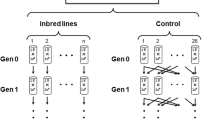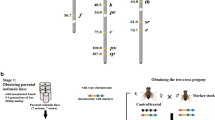Abstract
It is generally agreed that recombination offers a long-term evolutionary advantage1,2. It is argued, however, that because genetic variability exists for recombination rates in natural populations, response to immediate demands for adaptation should result in reduced recombination regardless of the long-term consequences. Nevertheless, genetic recombination persists. Numerous models have been developed to examine this fact1,2. There exists, however, a notable lack of empiricism on the recombination question. Here we demonstrate in Drosophila that the response of a polygenic character (DDT resistance) to directional selection is sufficiently correlated with the genetic variability generated by recombination to bring about a corresponding increase in recombination rate. We draw attention to the relationship of these results to existing models, notably the ‘hitch-hiking’ model3.
This is a preview of subscription content, access via your institution
Access options
Subscribe to this journal
Receive 51 print issues and online access
$199.00 per year
only $3.90 per issue
Buy this article
- Purchase on Springer Link
- Instant access to full article PDF
Prices may be subject to local taxes which are calculated during checkout
Similar content being viewed by others
References
Felsenstein, J. Genetics 78, 737–756 (1974).
Maynard Smith, J. Nature 268, 693–696 (1977).
Strobeck, C., Maynard Smith, J. & Charlesworth, B. Genetics 82, 547–558 (1976).
Merrell, D. J. & Underhill, J. C. J. econ. Ent. 49, 300–306 (1956).
Finney, D. J. Probit Analysis 4th edn (Cambridge University Press, Cambridge, 1971).
Epstein, S. S. & Shafner, H. Nature 219, 385–386 (1968).
Hart, M. M., Whang-Peng, J., Sieber, S. M., Fabro, S. & Adamson, R. H. Xenobiotica 2, 567–574 (1972).
Luers, H. Naturwissenschaften 40, 293–294 (1953).
Pielow, D. P. Can. J. Zool. 30, 375–377 (1952).
Rabello, M. N. et al. Mutat. Res. 28, 449–454 (1975).
Vogel, E. Mutat. Res. 16, 157–164 (1972).
Maynard Smith, J. Genet. Res. 35, 269–277 (1980).
Feldman, M. W., Christianson, F. B. & Brooks, L. D. Proc. natn. Acad. Sci. U.S.A. 77, 4838–4841 (1980).
Whittaker, R. H. Brookhaven Symp. Biol. 22, 178–185 (1969).
Levin, D. Am. Nat. 109, 437–451 (1975).
Gilbert, L. E. in Coevolution of Animals and Plants (eds Gilbert, L. E. & Raven, P. H.) 210–240 (University of Texas Press, Austin, 1975).
Author information
Authors and Affiliations
Rights and permissions
About this article
Cite this article
Flexon, P., Rodell, C. Genetic recombination and directional selection for DDT resistance in Drosophila melanogaster. Nature 298, 672–674 (1982). https://doi.org/10.1038/298672a0
Received:
Accepted:
Issue Date:
DOI: https://doi.org/10.1038/298672a0
This article is cited by
-
Seasonal changes in recombination characteristics in a natural population of Drosophila melanogaster
Heredity (2021)
-
Effect of manipulating recombination rates on response to selection in livestock breeding programs
Genetics Selection Evolution (2016)
-
Experimental evolution of recombination and crossover interference in Drosophila caused by directional selection for stress-related traits
BMC Biology (2015)
-
Species-specific responses of dew fly larvae to mycotoxins
Mycotoxin Research (2009)
-
An evolutionary view of human recombination
Nature Reviews Genetics (2007)
Comments
By submitting a comment you agree to abide by our Terms and Community Guidelines. If you find something abusive or that does not comply with our terms or guidelines please flag it as inappropriate.



